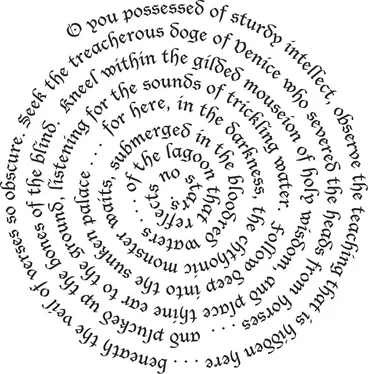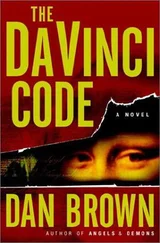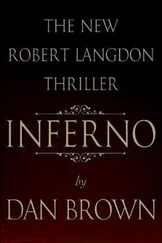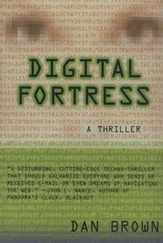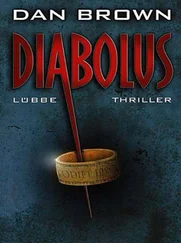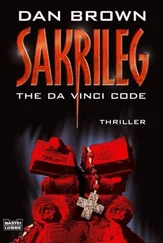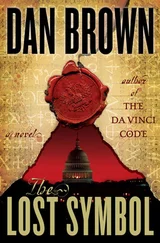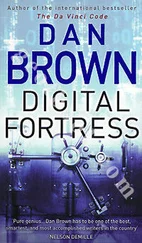Dan Brown - Inferno - A Novel
Здесь есть возможность читать онлайн «Dan Brown - Inferno - A Novel» весь текст электронной книги совершенно бесплатно (целиком полную версию без сокращений). В некоторых случаях можно слушать аудио, скачать через торрент в формате fb2 и присутствует краткое содержание. Год выпуска: 2013, ISBN: 2013, Издательство: Doubleday, Жанр: Старинная литература, на английском языке. Описание произведения, (предисловие) а так же отзывы посетителей доступны на портале библиотеки ЛибКат.
- Название:Inferno: A Novel
- Автор:
- Издательство:Doubleday
- Жанр:
- Год:2013
- ISBN:978-0-385-53786-5
- Рейтинг книги:4 / 5. Голосов: 1
-
Избранное:Добавить в избранное
- Отзывы:
-
Ваша оценка:
- 80
- 1
- 2
- 3
- 4
- 5
Inferno: A Novel: краткое содержание, описание и аннотация
Предлагаем к чтению аннотацию, описание, краткое содержание или предисловие (зависит от того, что написал сам автор книги «Inferno: A Novel»). Если вы не нашли необходимую информацию о книге — напишите в комментариях, мы постараемся отыскать её.
Inferno: A Novel — читать онлайн бесплатно полную книгу (весь текст) целиком
Ниже представлен текст книги, разбитый по страницам. Система сохранения места последней прочитанной страницы, позволяет с удобством читать онлайн бесплатно книгу «Inferno: A Novel», без необходимости каждый раз заново искать на чём Вы остановились. Поставьте закладку, и сможете в любой момент перейти на страницу, на которой закончили чтение.
Интервал:
Закладка:
Whether trying to prop up a stock market, justify a war, win an election, or lure a terrorist out of hiding, the world’s power brokers relied on massive disinformation schemes to help shape public perception.
It had always been this way.
In the sixties, the Russians built an entire fake spy network that dead-dropped bad intel that the British intercepted for years. In 1947, the U.S. Air Force manufactured an elaborate UFO hoax to divert attention from a classified plane crash in Roswell, New Mexico. And more recently, the world had been led to believe that weapons of mass destruction existed in Iraq.
For nearly three decades, the provost had helped powerful people protect, retain, and increase their power. Although he was exceptionally careful about the jobs he accepted, the provost had always feared that one day he would take the wrong job.
And now that day has arrived .
Every epic collapse, the provost believed, could be traced back to a single moment—a chance meeting, a bad decision, an indiscreet glance.
In this case, he realized, that instant had come almost a dozen years before, when he agreed to hire a young med school student who was looking for some extra money. The woman’s keen intellect, dazzling language skills, and knack for improvisation made her an instantaneous standout at the Consortium.
Sienna Brooks was a natural .
Sienna had immediately understood his operation, and the provost sensed that the young woman was no stranger to keeping secrets herself. Sienna worked for him for almost two years, earned a generous paycheck that helped her pay her med school tuition, and then, without warning, she announced that she was done. She wanted to save the world, and as she had told him, she couldn’t do it there.
The provost never imagined Sienna Brooks would resurface nearly a decade later, bringing with her a gift of sorts—an ultrawealthy prospective client.
Bertrand Zobrist.
The provost bristled at the memory.
This is Sienna’s fault .
She was party to Zobrist’s plan all along .
Nearby, at the C-130’s makeshift conference table, the conversation was becoming heated, with WHO officials talking on phones and arguing.
“Sienna Brooks?!” one demanded, shouting into the phone. “Are you sure?” The official listened a moment, frowning. “Okay, get me the details. I’ll hold.”
He covered the receiver and turned to his colleagues. “It sounds like Sienna Brooks departed Italy shortly after we did.”
Everyone at the table stiffened.
“How?” one female employee demanded. “We covered the airport, bridges, train station …”
“Nicelli airfield,” he replied. “On the Lido.”
“Not possible,” the woman countered, shaking her head. “Nicelli is tiny. There are no flights out. It handles only local helicopter tours and—”
“Somehow Sienna Brooks had access to a private jet that was hangared at Nicelli. They’re still looking into it.” He raised the receiver to his mouth again. “Yes, I’m here. What do you have?” As he listened to the update, his shoulders slumped lower and lower until finally he took a seat. “I understand. Thank you.” He ended the call.
His colleagues all stared at him expectantly.
“Sienna’s jet was headed for Turkey,” the man said, rubbing his eyes.
“Then call European Air Transport Command!” someone declared. “Have them turn the jet around!”
“I can’t,” the man said. “It landed twelve minutes ago at Hezarfen private airfield, only fifteen miles from here. Sienna Brooks is gone.”
CHAPTER 87
Rain was now pelting the ancient dome of Hagia Sophia.
For nearly a thousand years, it had been the largest church in the world, and even now it was hard to imagine anything larger. Seeing it again, Langdon was reminded that the Emperor Justinian, upon the completion of Hagia Sophia, had stepped back and proudly proclaimed, “Solomon, I have outdone thee!”
Sinskey and Brüder were marching with intensifying purpose toward the monumental building, which only seemed to swell in size as they approached.
The walkways here were lined with the ancient cannonballs used by the forces of Mehmet the Conqueror—a decorative reminder that the history of this building had been filled with violence as it was conquered and then retasked to serve the spiritual needs of assorted victorious powers.
As they neared the southern facade, Langdon glanced to his right at the three domed, silolike appendages jutting off the building. These were the Mausoleums of the Sultans, one of whom—Murad III—was said to have fathered over a hundred children.
The ring of a cell phone cut the night air, and Brüder fished his out, checking the caller ID, and answered tersely: “Anything?”
As he listened to the report, he shook his head in disbelief. “How is that possible?” He listened further and sighed. “Okay, keep me posted. We’re about to go inside.” He hung up.
“What is it?” Sinskey demanded.
“Keep your eyes open,” Brüder said, glancing around the area. “We may have company.” He returned his gaze to Sinskey. “It sounds like Sienna Brooks is in Istanbul.”
Langdon stared at the man, incredulous to hear both that Sienna had found a way to get to Turkey, and also that, having successfully escaped from Venice, she would risk capture and possible death to ensure that Bertrand Zobrist’s plan succeeded.
Sinskey looked equally alarmed and drew a breath as if preparing to interrogate Brüder further, but she apparently thought better of it, turning instead to Langdon. “Which way?”
Langdon pointed to their left around the southwest corner of the building. “The Fountain of Ablutions is over here,” he said.
Their rendezvous point with the museum contact was an ornately latticed wellhead that had once been used for ritual washing before Muslim prayer.
“Professor Langdon!” a man’s voice shouted as they drew near.
A smiling Turkish man stepped out from under the octagonal cupola that covered the fountain. He was waving his arms excitedly. “Professor, over here!”
Langdon and the others hurried over.
“Hello, my name is Mirsat,” he said, his accented English voice brimming with enthusiasm. He was a slight man with thinning hair, scholarly-looking glasses, and a gray suit. “This is a great honor for me.”
“The honor is ours,” Langdon replied, shaking Mirsat’s hand. “Thank you for your hospitality on such short notice.”
“Yes, yes!”
“I’m Elizabeth Sinskey,” Dr. Sinskey said, shaking Mirsat’s hand and then motioning to Brüder. “And this is Cristoph Brüder. We’re here to assist Professor Langdon. I’m so sorry our plane was delayed. You’re very kind to accommodate us.”
“Please! Think nothing of it!” Mirsat gushed. “For Professor Langdon I would give a private tour at any hour. His little book Christian Symbols in the Muslim World is a favorite in our museum gift shop.”
Really? Langdon thought. Now I know the one place on earth that carries that book .
“Shall we?” Mirsat said, motioning for them to follow.
The group hurried across a small open space, passing the regular tourist entrance and continuing on to what had originally been the building’s main entrance—three deeply recessed archways with massive bronze doors.
Two armed security guards were waiting to greet them. Upon seeing Mirsat, the guards unlocked one of the doors and swung it open.
“Sağ olun,” Mirsat said, uttering one of a handful of Turkish phrases Langdon was familiar with—an especially polite form of “thank you.”
The group stepped through, and the guards closed the heavy doors behind them, the thud resonating through the stone interior.
Читать дальшеИнтервал:
Закладка:
Похожие книги на «Inferno: A Novel»
Представляем Вашему вниманию похожие книги на «Inferno: A Novel» списком для выбора. Мы отобрали схожую по названию и смыслу литературу в надежде предоставить читателям больше вариантов отыскать новые, интересные, ещё непрочитанные произведения.
Обсуждение, отзывы о книге «Inferno: A Novel» и просто собственные мнения читателей. Оставьте ваши комментарии, напишите, что Вы думаете о произведении, его смысле или главных героях. Укажите что конкретно понравилось, а что нет, и почему Вы так считаете.
